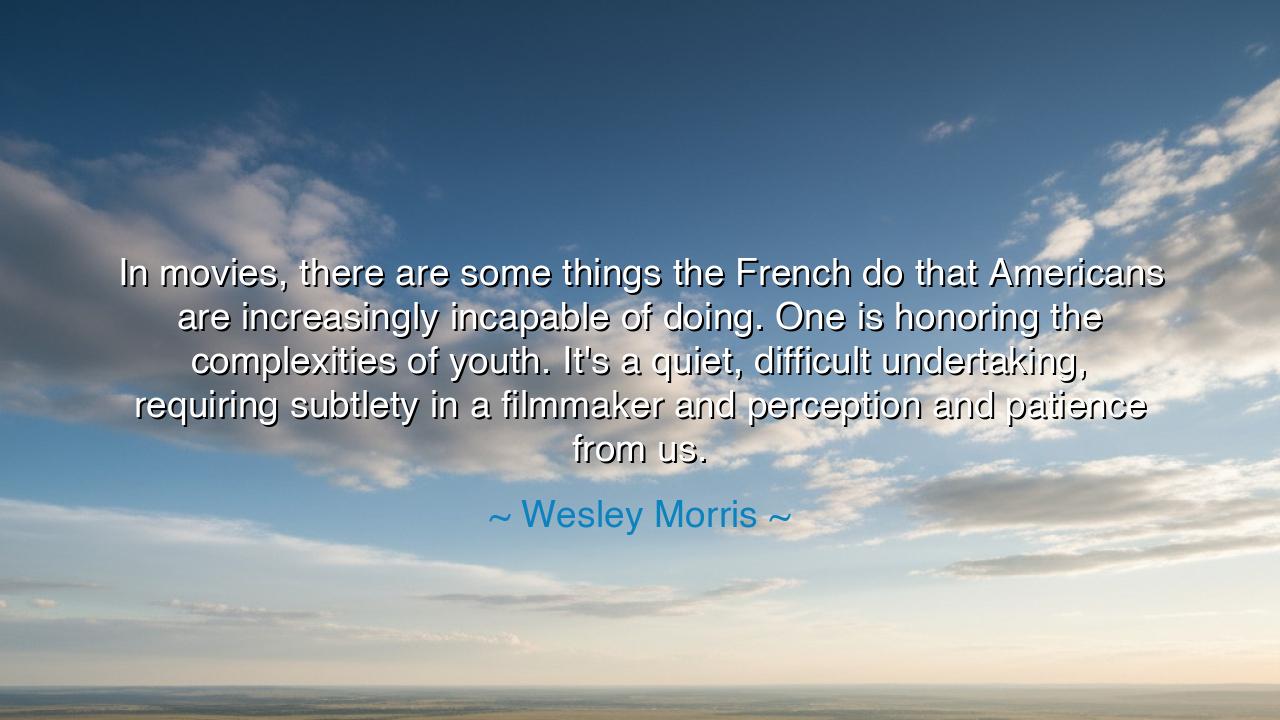
In movies, there are some things the French do that Americans
In movies, there are some things the French do that Americans are increasingly incapable of doing. One is honoring the complexities of youth. It's a quiet, difficult undertaking, requiring subtlety in a filmmaker and perception and patience from us.






Hear, O seekers of truth in art and life, the words of Wesley Morris: “In movies, there are some things the French do that Americans are increasingly incapable of doing. One is honoring the complexities of youth. It’s a quiet, difficult undertaking, requiring subtlety in a filmmaker and perception and patience from us.” At first glance, this seems but a critic’s observation. Yet if we look deeper, we find a truth that reaches beyond the screen, into the heart of human understanding itself. For to capture the essence of youth—its contradictions, its struggles, its beauty—is to mirror life in its rawest and most delicate form.
From the beginning of storytelling, poets, playwrights, and artists have sought to preserve the fragile season of youth. It is an age neither child nor adult, filled with longing and rebellion, with innocence and awakening. To portray it truthfully requires not the blunt hammer of spectacle, but the gentle hand of subtlety, the willingness to dwell in quiet moments and unresolved questions. Morris praises the French, for their cinema often lingers in silence, in ambiguity, in small gestures that reveal the great mysteries of coming of age. And he laments that American film, driven by haste and loudness, too often loses this art.
Consider, O listeners, the French film The 400 Blows by François Truffaut. It did not shout its message; it whispered. It showed a boy’s struggles with authority, neglect, and the hunger for freedom. There were no easy answers, no false resolutions, only the truth of a child standing at the edge of the sea, facing life’s immensity. This is what it means to honor the complexities of youth—to show that growth is not a straight path, but a labyrinth, and that within its corridors lies the very essence of the human spirit.
So too in history we find the same lesson. The philosopher Plato wrote of educating the young not as filling a vessel, but as kindling a flame. This required patience, attention to the soul’s subtle changes, and respect for the questions that arise in adolescence. He knew that to rush or to simplify was to do violence to the truth of youth. Morris’s words echo this ancient wisdom: that to understand youth, whether in art or in life, demands the willingness to wait, to perceive, and to embrace contradiction.
The meaning, then, is not confined to cinema. It is a reminder to us all that to honor youth is to resist the temptation of simplification. In our world, where speed and spectacle dominate, we are quick to reduce the young to stereotypes, to mock their struggles, or to demand from them clarity they do not yet possess. But to walk with them—to honor their complexity—is to acknowledge that growth is messy, fragile, and sacred. This requires from us patience not only as viewers of films, but as parents, teachers, mentors, and friends.
The lesson is clear: if you would truly understand the young, do not demand quick answers. Instead, practice subtlety and perception. Listen more than you speak. Watch for the unspoken signs—the silence, the hesitation, the quiet courage. Allow them to wrestle with questions without rushing to resolve them. In doing so, you mirror the greatest filmmakers and the wisest teachers, for you honor not the image of youth, but the truth of it.
Practical actions lie before you. When you engage with the young, set aside judgment and haste. Offer them the gift of time and presence. Choose art and stories that reflect their depth, rather than only their surface. And in your own soul, recall your youth—not with mockery, but with compassion for the struggles you once faced. For in honoring the young, you also honor the humanity within yourself.
Therefore, O children of tomorrow, let Wesley Morris’s words guide you: in art and in life, do not forsake the complexities of youth. For to portray them truthfully is to glimpse the mystery of human becoming. It is a work both quiet and difficult, but it is also a sacred duty, requiring from us not haste, but patience, not judgment, but perception. If you embrace this path, you will not only see youth more clearly—you will see life itself more deeply.






AAdministratorAdministrator
Welcome, honored guests. Please leave a comment, we will respond soon